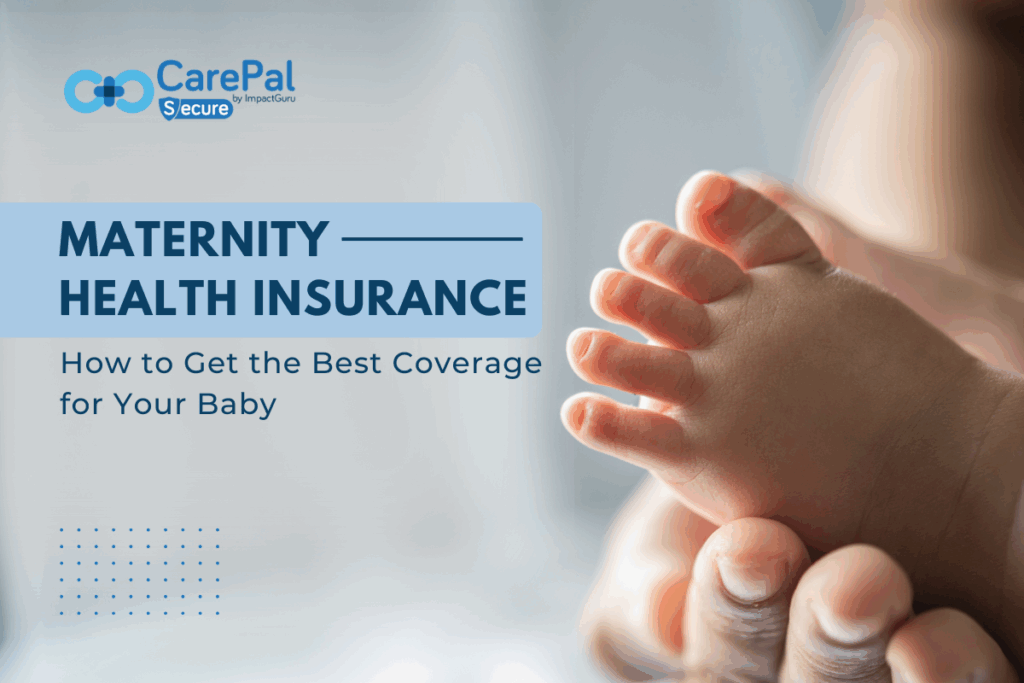Maternity Health Insurance: How to Get the Best Coverage for Your Baby

Health Insurance with maternity benefits is a very popular option in India. Not only do most employers give group health insurance with maternity benefits, most customers assume that maternity is covered in their private insurance plans as well. This is not true. In reality, only about 12% of medical policies bought in India come with maternity benefits. The majority of these policies are purchased by consumers between the ages of 25 and 35. What young prospective parents need to understand is that Health insurance with maternity benefits is a useful but expensive proposition. There has been a steady rise in maternity-related healthcare costs in the past few years in India. There are many reasons for this rise ranging from an increasing age of mothers, advances in medical technology, greater demand for quality care and rising hospital costs. For young parents, planning for maternity related expenses in a way that does not put them under financial stress is one of the first steps in financial planning and a health insurance plan with maternity benefits is very useful.
In this blog, we take a look at how maternity care costs are increasing in India, how insurance can help, and what can be your options under private insurance, employer-provided coverage, or government schemes designed for eking out economically weaker sections.
What is driving up maternity expenses in Indian hospitals?
Some of the reasons behind the rising costs of maternity care in India include:
Surge in Cesarean Deliveries: Cesarean deliveries have surged many fold and cost several times more compared to normal deliveries. As per a Times of India report, the share of cesarean deliveries in India has gone from 17% in 2016 to almost 22% in 2024. The rise in Caesarean deliveries is a result of two trends. First, the average age of delivery is increasing, particularly in Urban India. And while this can be a good thing as the mother is more mature in every way to take care of the baby, higher age deliveries also come with complications. Secondly, C-sections are recommended by many private hospitals, some unscrupulously, resulting in higher costs.
Increasing hospitalization costs: Due to the various private hospitals becoming upgraded and better equipped with the latest medical services, the overall cost of hospitalization in India has increased substantially. Maternity related expense increase is therefore part of an overall trend where increased quality and services come with a higher price tag.
Increased Consultation& Diagnostic Fees: Regular prenatal checkups & diagnostics are one of the best ways to prevent pregnancy risks and have been instrumental in reducing child mortality and death due to pregnancy among women. However, these are now getting more costly due to an increasing demand for quality services, as well as ultrasounds.
Higher post-delivery expenses: The increasing expense over post-natal treatment comprising baby care, vaccination, and specialized pediatric appointments are also adding to the higher cost maternity.
Preference for private hospitals: There is a marked preference for private hospitals in case of pregnancy, particularly in urban areas. Pregnancy related hospitalization is only one of its kind in the sense that it is a happy occasion for the family. Hence, there is an understandable urge to celebrate the occasion. But just as the happiness is understandable, so is the economic law that higher the demand for a service, greater the price.
Increasing the cost of maternity is a worldwide trend and not particularly to India alone. However, unlike most of the world, health insurance coverage in India is very low and therefore the burden of maternity expense can be a big one for the family. This is where health insurance with maternity benefits can be a big help.
How does a health insurance with maternity benefits work?
Maternity insurance plans are available, with several health insurers as standalone plans as well as an add-on to the base health policy. However, the extent and type of maternity benefits does their health insurance plan cover is something that the customer should clearly verify at the time of purchase. A typical health insurance with maternity benefits will cover expenditures on pregnancy, childbirth, and postnatal care. These expenses usually include:
Cost per delivery (normal / cesarean)
Fraud and abuse detection on post-expenditure:
Doctor’s consultation fees
Diagnostic tests and sonograms
Newborn baby cover for a certain duration
Medication and postnatal care
Health insurance plan with maternity benefits is usually of two varieties.
Family Floater Plans with Maternity Coverage: Certain family floater health plans offer maternity cover as an inbuilt feature. They include the insured and dependents, allowing growing families flexibility and affordability.
Comprehensive Health Insurance Rider Advantages: Many comprehensive health policies provide maternity coverage as a rider or add-on for customers who want to add this feature to their existing health insurance plan. They may have longer waiting periods but can be useful if you have broader coverage under a health policy.
Five key factors to select the best health insurance with maternity benefits.
Waiting Period: One thing to note is that most maternity insurance plans have a waiting period, i.e., you need to plan ahead before you can avail of these benefits. And this is logical since maternity is not a sudden and sad event like an accident or illness, but in most cases is a planned and happy event.
Assess Coverage: Some policies will cover your newborn, the cost of their vaccinations, postnatal care, while others may not. Pick a policy at maximum coverage.
Premium and Affordability: Maternity insurance usually has higher premiums. Decide whether the positives outweigh the negatives, particularly if you have an option of employer group health insurance scheme.
Look for Network Hospitals: Opt for an insurer that has a long list of cashless hospitals for easy hospitalization and claims settlement. And while the network list of insurers is stable, there is always a chance that the hospital you have chosen might not have tie ups with your insurance provider on the day you want it. Hence, always confirm and check with your health insurance.
Consider Extra Benefits: Some policies include additional perks like pre-natal and post-natal consultations, wellness programs, and lactation support.
Some of the best maternity insurance plans in India currently are:
HDFC Ergo My Health Suraksha
Star Health Comprehensive Plan
Care health maternity insurance cover
Group Health Insurance Provided by Employer
Group health insurance with maternity benefits are offered by many companies. If you are looking for good maternity cover, one of the best ways to get it is to see whether it is covered through employer-sponsored insurance. There are two advantages to an employer-provided group health insurance plan with respect to maternity. First, there is no waiting period as is the case in a private health insurance pla. Secondly, if your employer-provided group health insurance covers maternity expenses, that means you can opt out of maternity benefit in your private health insurance plan and reduce your costs. Employees should get in touch with their HR department to find out what maternity benefits are available with their company’s health insurance policy.
Government and charitable maternity schemes for low-Income Families
It’s a sad reality in India that not everyone can afford private health insurance or work in a company which provides good health benefits. However, for such citizens also there are options that can be explored. The Indian government and several charitable organizations provide maternity benefits for those who cannot afford private maternity insurance.
Some notable maternity benefits schemes run by the Central government and its agencies are:
Ayushman Bharat–PMJAY: Under the Ayushman Bharat health scheme, hospitalization expenses of up to ₹5 lakh will be paid per family per year, which also includes maternity-related expenses for economically weaker sections.
Employees’ State Insurance Scheme (ESI): Maternity benefits (paid leave and medical care during pregnancy and childbirth) are provided to women working in the organized sector, under the ESI scheme.
Category | Rural Areas (₹) | Urban Areas (₹) |
Low-performing states (LPS) | ₹1,400 to the mother + ₹600 to the ASHA worker | ₹1,000 to the mother + ₹400 to the ASHA worker |
High-performing states (HPS) | ₹700 to the mother + ₹600 to the ASHA worker | ₹600 to the mother + ₹400 to the ASHA worker |
Janani suraksha yojna (JSY): The plan provides cash assistance in the form of incentive to very poor, pregnant women for delivering in a hospital and to reduce the rates of maternal death.
Pradhan Mantri Matru Vandana Yojana (PMMVY): The Pradhan Mantri Matru Vandana Yojana (PMMVY) is run by Central government and provides a cash incentive of ₹5,000 for the first living child, disbursed in two installments, and ₹6,000 for the second child if it is a girl, in one installment, to pregnant women and lactating mothers.
State-Specific maternity benefits schemes
In India health is a state subject and to this end, many progressive states have initiated maternal support programs of their own, such as the Dr. Muthulakshmi Maternity Benefit Scheme in Tamil Nadu and Mamta Scheme in Gujarat, offering cash incentives to pregnant women to seek institutional delivery services.
FAQs on Maternity Insurance
I am already pregnant. Can I purchase maternity insurance?
Most maternity insurance plans do not cover pre-existing pregnancies with a waiting period.
How long is the waiting period for maternity insurance?
Waiting periods for maternity benefits under private health insurance typically last between 9 months and 4 years, depending on the insurer, as well as policy.
Are C-section deliveries covered by maternity insurance?
Yes, usually maternity insurance policies will cover both normal and cesarean deliveries.
Does the health insurance group through my employer cover maternity?
Yes, a lot of employers cover maternity benefits in their group health policies with little or no waiting period. However, it is advisable to contact your HR department to clarify the nature and scope of coverage.
Are newborn baby expenses covered by maternity insurance?
Some policies will cover the newborn for a given time as well, such as vaccinations and other medical care.
Do you want to know more about individual maternity insurance plans? Let us know in the comments!
Conclusion:
Secure is designed to provide you and your family with comprehensive, accessible, and affordable healthcare solutions. Whether you’re an individual, a family, or a senior citizen, there’s a plan designed to provide financial security and peace of mind.
Some key reasons why you should choose CarePal Secure are:
Extensive Coverage: Get access to a wide network of hospitals for cashless treatments, covering everything from regular health check-ups to major hospitalisations.
No Waiting Period for Essential Coverage: CarePal Secure offers immediate access to essential healthcare benefits so that yCarePal ou can receive critical medical treatment without long approval delays.
24/7 Medical Assistance & Claims Support: Our dedicated helpdesk is available round-the-clock to assist you with medical emergencies, claim processing, and consultation bookings.
Teleconsultations & Healthcare Discounts: Our seamless teleconsultation services allow you to access specialists across 18+ medical fields. Additionally, you can enjoy significant savings on medicines, diagnostic tests, and outpatient care, making quality healthcare more affordable.
Affordable Plans with Super Top-Up Options: Choose from a range of budget-friendly plans for individuals, families, and seniors. Our super top-up policy for seniors provides additional financial protection, covering larger medical expenses at a lower cost.
Tax Benefits Under Section 80D: The premiums paid toward CarePal Secure health insurance are tax-deductible, helping you save money while ensuring comprehensive coverage for yourself and your family.
With trusted partners nationwide, CarePal Secure ensures that quality healthcare is always within reach. So what are you waiting for? Join 80,000+ satisfied customers who trust CarePal Secure for their healthcare needs.
Get in touch with us to know the right plan for you
Frequently Asked Questions
Maternity health insurance covers expenses related to childbirth, including delivery (normal or C-section), prenatal, and postnatal care. It ensures financial support during one of life’s most important phases.
Plans like CarePal Secure Max and other comprehensive health policies often include maternity benefits. Look for policies with short waiting periods and broad hospital networks.
Yes, most maternity plans cover both normal and cesarean deliveries, along with hospitalization and newborn care expenses.
Ideally, buy it at least 1–2 years before planning a baby, as most plans have a waiting period before benefits kick in.
Some insurers allow add-ons for maternity coverage, but it depends on the provider. Check with your insurer for upgrade or rider options.

Pankaj Nawani is an accomplished insurance professional with over 20 years of industry experience. His journey has reinforced two key beliefs: that insurance is a powerful force for good and that India needs significantly more of it. Passionate about transforming the sector, Pankaj is on a mission to redefine insurance for India, focusing on innovation across products, sales, and servicing. He collaborates with visionary entrepreneurs, founders, and investors to bring this vision to life.












